When is the Budget and what is the ‘stealth’ tax rise Labour are set to keep?
Millions could pay more income tax if ‘stealth’ policy is continued

Your support helps us to tell the story
From reproductive rights to climate change to Big Tech, The Independent is on the ground when the story is developing. Whether it's investigating the financials of Elon Musk's pro-Trump PAC or producing our latest documentary, 'The A Word', which shines a light on the American women fighting for reproductive rights, we know how important it is to parse out the facts from the messaging.
At such a critical moment in US history, we need reporters on the ground. Your donation allows us to keep sending journalists to speak to both sides of the story.
The Independent is trusted by Americans across the entire political spectrum. And unlike many other quality news outlets, we choose not to lock Americans out of our reporting and analysis with paywalls. We believe quality journalism should be available to everyone, paid for by those who can afford it.
Your support makes all the difference.Labour is expected to extend an income tax measure that has been described as a “stealth tax” at the upcoming Budget as more people are set to pay higher rates.
Officials have said Rachel Reeves is looking to extend the freeze on income tax thresholds, which has dragged millions of earners into paying higher rates of income tax since 2021.
Experts predict the move could raise £7bn a year for the Exchequer – but has been criticised by some as an underhand way to raise tax. Some critics have claimed that doing so would break a central Labour manifesto pledge to “not increase taxes on working people.”
However, responding to the reports, a government source told the Financial Times: “We said we would protect working people and not increase rates of income tax, national insurance or VAT.”
Many have taken this to mean that the government would not consider extending the freeze as an income tax rise, as it would technically remain the same.

Labour’s own criticism of the measure when it was introduced in 2021 would call this into question. Responding to its introduction, then-shadow chancellor Ms Reeves said: “People on average earnings are paying more in tax because they are dragged into higher tax brackets.
“That is a sign of failure. The government is picking the pockets of working people,” she added.
The income tax threshold freeze has been criticised as a way for the Treasury to boost revenue from income tax without increasing its rates. Since 2021, the personal allowance has been frozen at £12,570. This is the amount that can be paid before income tax deductions begin.
The basic rate of 20 per cent is paid on earnings up to £37,700, the higher rate of 40 per cent on earnings up to £125,140, and the additional rate of 45 per cent on earnings over £125,141.
Rather than increasing with inflation or average earnings as in previous years, these rates will all remain frozen until at least 2028. Labour’s latest plans now mean they could be held for even longer.

The effect of this is what economists call “fiscal drag,” where more people are pulled into higher tax brackets as their earnings increase, but the thresholds stay the same.
The respected Institute for Fiscal Studies (IFS) says these freezes will reduce household incomes by an average of £1,250 by 2025/26. Analysts also point out that the measure will take more from workers’ pockets than any of the recent drops in national insurance and income in recent years.
While households began pulling back £20 billion a year from the Exchequer after these tax measures, they write that the income tax threshold freeze loses them £40 billion. This means that for every £1 the average household has gained in recent years, they have lost £2.
It is estimated that continuing the measure will raise over £33.5 billion a year for the government by 2028/29, making it an attractive option for the chancellor ahead of the Budget on 30 October.
Ms Reeves has also been criticised in recent weeks for reportedly exploring an increase in employer national insurance contributions. As with income tax threshold freezes, critics have said Labour is deploying language trickery to avoid accusations of breaking its manifesto pledges.
When is the Budget 2024?
The Budget speech will be delivered by Rachel Reeves at the House of Commons on Wednesday, 30 October.
The schedule for the day is somewhat flexible, as Prime Minister’s Questions takes place first at 12pm. That should last around 30 minutes and will be followed by the Budget, with a short break likely to take place in between the two at the discretion of the Speaker, Sir Lindsay Hoyle.
Join our commenting forum
Join thought-provoking conversations, follow other Independent readers and see their replies
Comments